Western Sydney University 401013: Case Study of Munny's Mental Health
VerifiedAdded on 2022/09/17
|10
|2723
|15
Case Study
AI Summary
This nursing assignment presents a case study of Munny, a man of Cambodian origin, and analyzes his mental health condition. The assignment begins with an assessment of Munny's mental state examination (MSE), including his general appearance, behavior, affect, and mood, which indicate symptoms of depression. It then explores potential causes of his mental health issues, such as childhood trauma, including witnessing his father's death and experiences in a concentration camp, as well as workplace stress and the loss of his mother. The assignment also discusses the application of the Stress Vulnerability model to Munny's case. Finally, the assignment outlines positive aspects of mental health recovery, focusing on empowerment, hope, and respect, along with strategies for healthcare professionals to support Munny's recovery, including referral services, employer support, and personal training programs. References from various academic sources are used to support the analysis and recommendations.
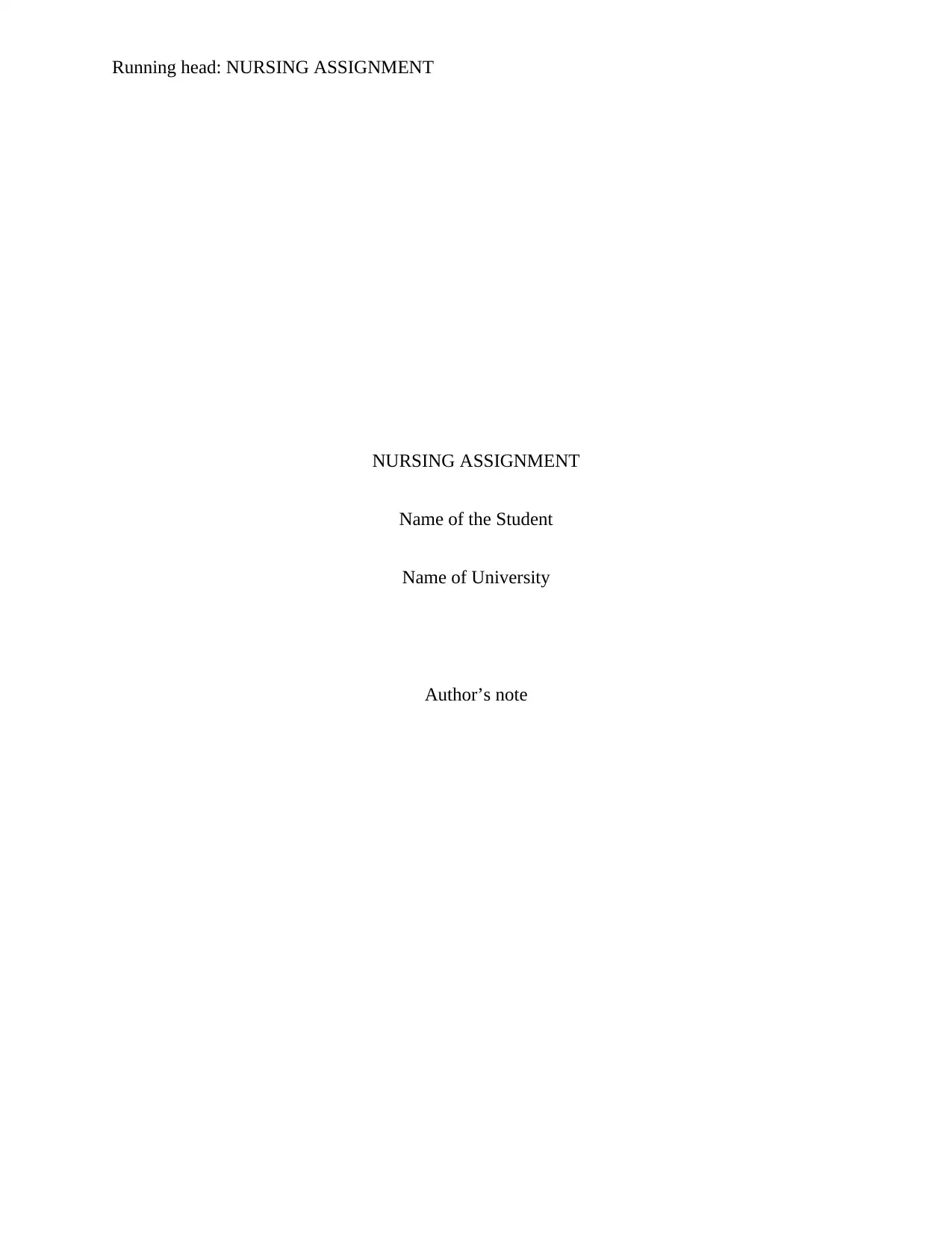
Running head: NURSING ASSIGNMENT
NURSING ASSIGNMENT
Name of the Student
Name of University
Author’s note
NURSING ASSIGNMENT
Name of the Student
Name of University
Author’s note
Paraphrase This Document
Need a fresh take? Get an instant paraphrase of this document with our AI Paraphraser
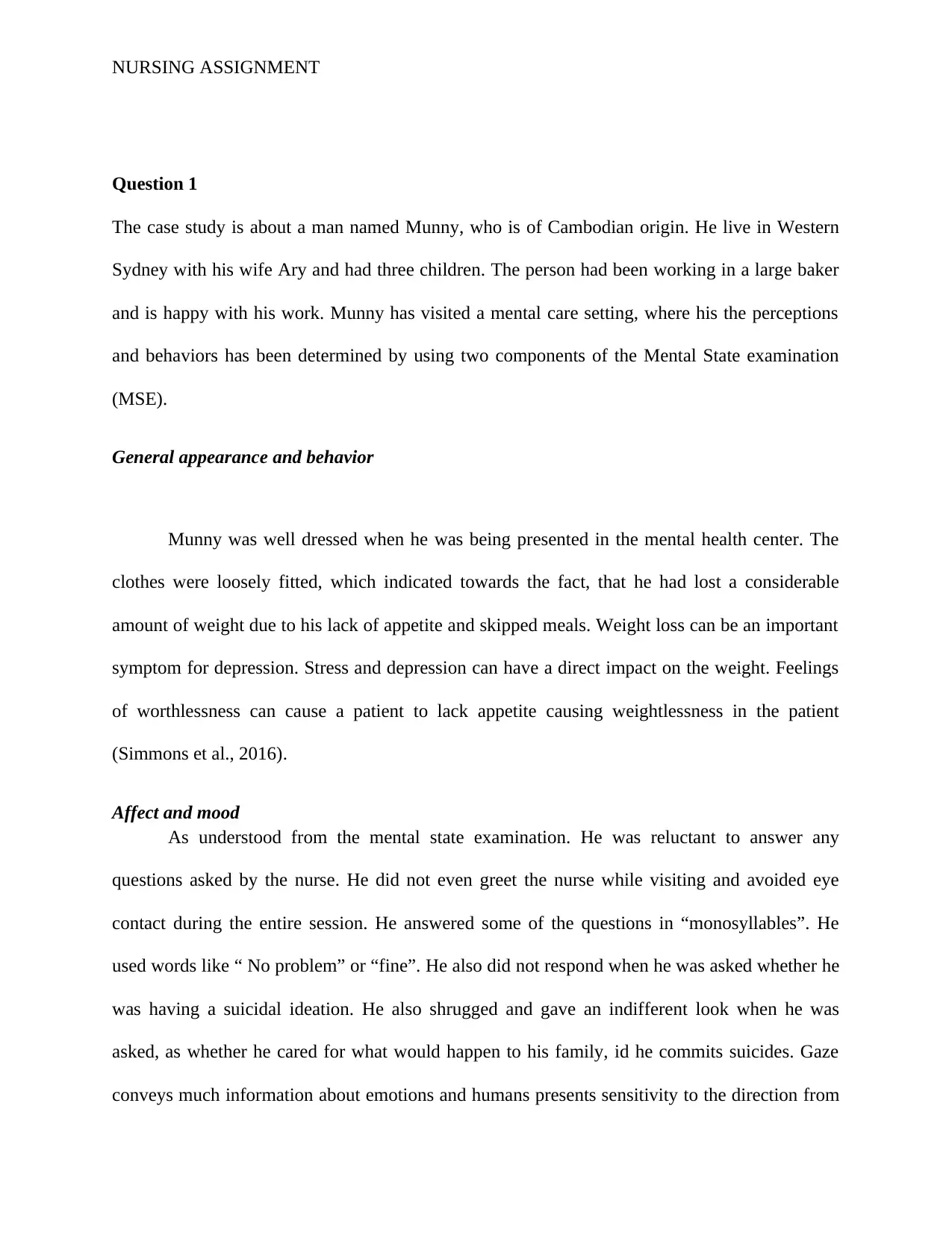
NURSING ASSIGNMENT
Question 1
The case study is about a man named Munny, who is of Cambodian origin. He live in Western
Sydney with his wife Ary and had three children. The person had been working in a large baker
and is happy with his work. Munny has visited a mental care setting, where his the perceptions
and behaviors has been determined by using two components of the Mental State examination
(MSE).
General appearance and behavior
Munny was well dressed when he was being presented in the mental health center. The
clothes were loosely fitted, which indicated towards the fact, that he had lost a considerable
amount of weight due to his lack of appetite and skipped meals. Weight loss can be an important
symptom for depression. Stress and depression can have a direct impact on the weight. Feelings
of worthlessness can cause a patient to lack appetite causing weightlessness in the patient
(Simmons et al., 2016).
Affect and mood
As understood from the mental state examination. He was reluctant to answer any
questions asked by the nurse. He did not even greet the nurse while visiting and avoided eye
contact during the entire session. He answered some of the questions in “monosyllables”. He
used words like “ No problem” or “fine”. He also did not respond when he was asked whether he
was having a suicidal ideation. He also shrugged and gave an indifferent look when he was
asked, as whether he cared for what would happen to his family, id he commits suicides. Gaze
conveys much information about emotions and humans presents sensitivity to the direction from
Question 1
The case study is about a man named Munny, who is of Cambodian origin. He live in Western
Sydney with his wife Ary and had three children. The person had been working in a large baker
and is happy with his work. Munny has visited a mental care setting, where his the perceptions
and behaviors has been determined by using two components of the Mental State examination
(MSE).
General appearance and behavior
Munny was well dressed when he was being presented in the mental health center. The
clothes were loosely fitted, which indicated towards the fact, that he had lost a considerable
amount of weight due to his lack of appetite and skipped meals. Weight loss can be an important
symptom for depression. Stress and depression can have a direct impact on the weight. Feelings
of worthlessness can cause a patient to lack appetite causing weightlessness in the patient
(Simmons et al., 2016).
Affect and mood
As understood from the mental state examination. He was reluctant to answer any
questions asked by the nurse. He did not even greet the nurse while visiting and avoided eye
contact during the entire session. He answered some of the questions in “monosyllables”. He
used words like “ No problem” or “fine”. He also did not respond when he was asked whether he
was having a suicidal ideation. He also shrugged and gave an indifferent look when he was
asked, as whether he cared for what would happen to his family, id he commits suicides. Gaze
conveys much information about emotions and humans presents sensitivity to the direction from
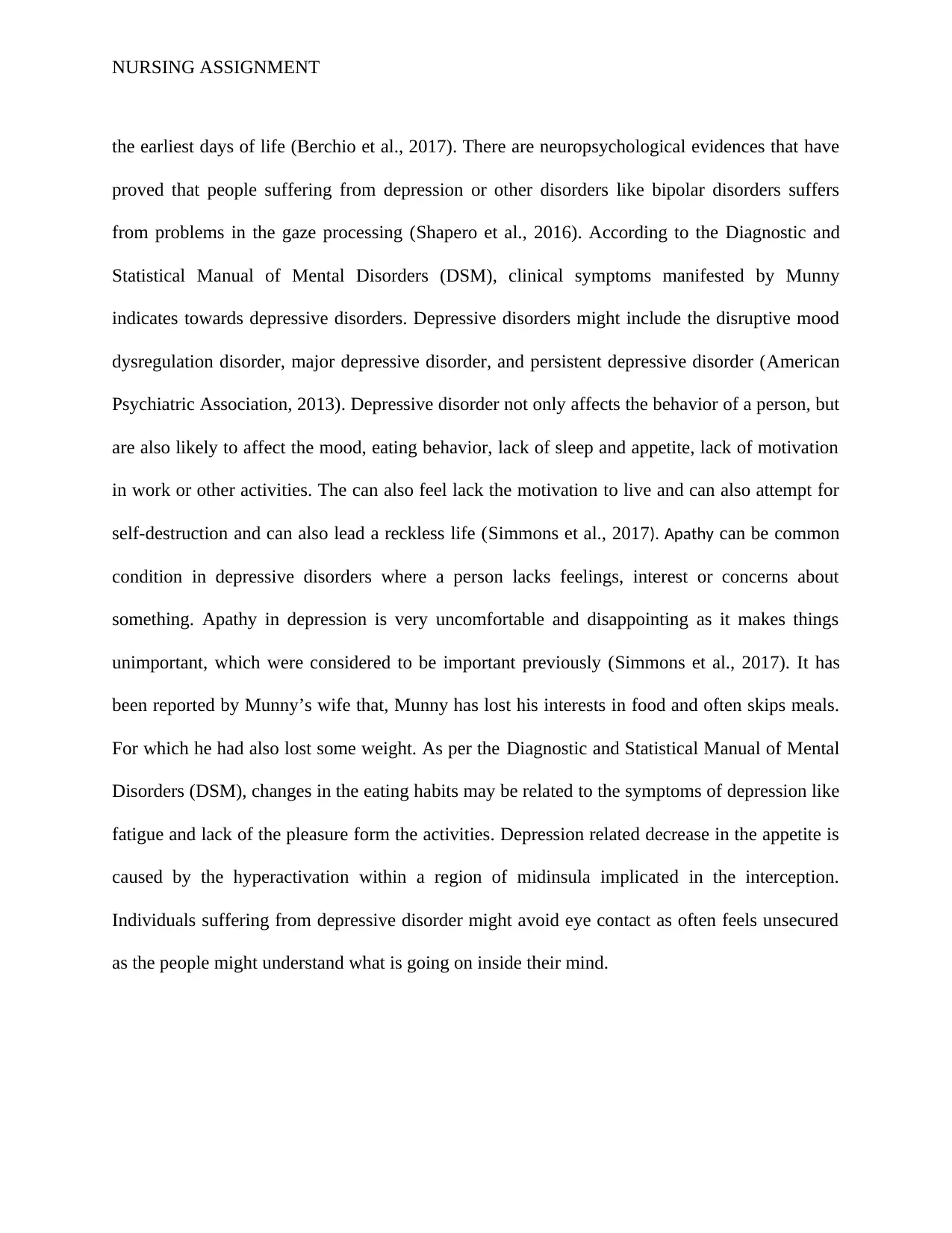
NURSING ASSIGNMENT
the earliest days of life (Berchio et al., 2017). There are neuropsychological evidences that have
proved that people suffering from depression or other disorders like bipolar disorders suffers
from problems in the gaze processing (Shapero et al., 2016). According to the Diagnostic and
Statistical Manual of Mental Disorders (DSM), clinical symptoms manifested by Munny
indicates towards depressive disorders. Depressive disorders might include the disruptive mood
dysregulation disorder, major depressive disorder, and persistent depressive disorder (American
Psychiatric Association, 2013). Depressive disorder not only affects the behavior of a person, but
are also likely to affect the mood, eating behavior, lack of sleep and appetite, lack of motivation
in work or other activities. The can also feel lack the motivation to live and can also attempt for
self-destruction and can also lead a reckless life (Simmons et al., 2017). Apathy can be common
condition in depressive disorders where a person lacks feelings, interest or concerns about
something. Apathy in depression is very uncomfortable and disappointing as it makes things
unimportant, which were considered to be important previously (Simmons et al., 2017). It has
been reported by Munny’s wife that, Munny has lost his interests in food and often skips meals.
For which he had also lost some weight. As per the Diagnostic and Statistical Manual of Mental
Disorders (DSM), changes in the eating habits may be related to the symptoms of depression like
fatigue and lack of the pleasure form the activities. Depression related decrease in the appetite is
caused by the hyperactivation within a region of midinsula implicated in the interception.
Individuals suffering from depressive disorder might avoid eye contact as often feels unsecured
as the people might understand what is going on inside their mind.
the earliest days of life (Berchio et al., 2017). There are neuropsychological evidences that have
proved that people suffering from depression or other disorders like bipolar disorders suffers
from problems in the gaze processing (Shapero et al., 2016). According to the Diagnostic and
Statistical Manual of Mental Disorders (DSM), clinical symptoms manifested by Munny
indicates towards depressive disorders. Depressive disorders might include the disruptive mood
dysregulation disorder, major depressive disorder, and persistent depressive disorder (American
Psychiatric Association, 2013). Depressive disorder not only affects the behavior of a person, but
are also likely to affect the mood, eating behavior, lack of sleep and appetite, lack of motivation
in work or other activities. The can also feel lack the motivation to live and can also attempt for
self-destruction and can also lead a reckless life (Simmons et al., 2017). Apathy can be common
condition in depressive disorders where a person lacks feelings, interest or concerns about
something. Apathy in depression is very uncomfortable and disappointing as it makes things
unimportant, which were considered to be important previously (Simmons et al., 2017). It has
been reported by Munny’s wife that, Munny has lost his interests in food and often skips meals.
For which he had also lost some weight. As per the Diagnostic and Statistical Manual of Mental
Disorders (DSM), changes in the eating habits may be related to the symptoms of depression like
fatigue and lack of the pleasure form the activities. Depression related decrease in the appetite is
caused by the hyperactivation within a region of midinsula implicated in the interception.
Individuals suffering from depressive disorder might avoid eye contact as often feels unsecured
as the people might understand what is going on inside their mind.
⊘ This is a preview!⊘
Do you want full access?
Subscribe today to unlock all pages.

Trusted by 1+ million students worldwide
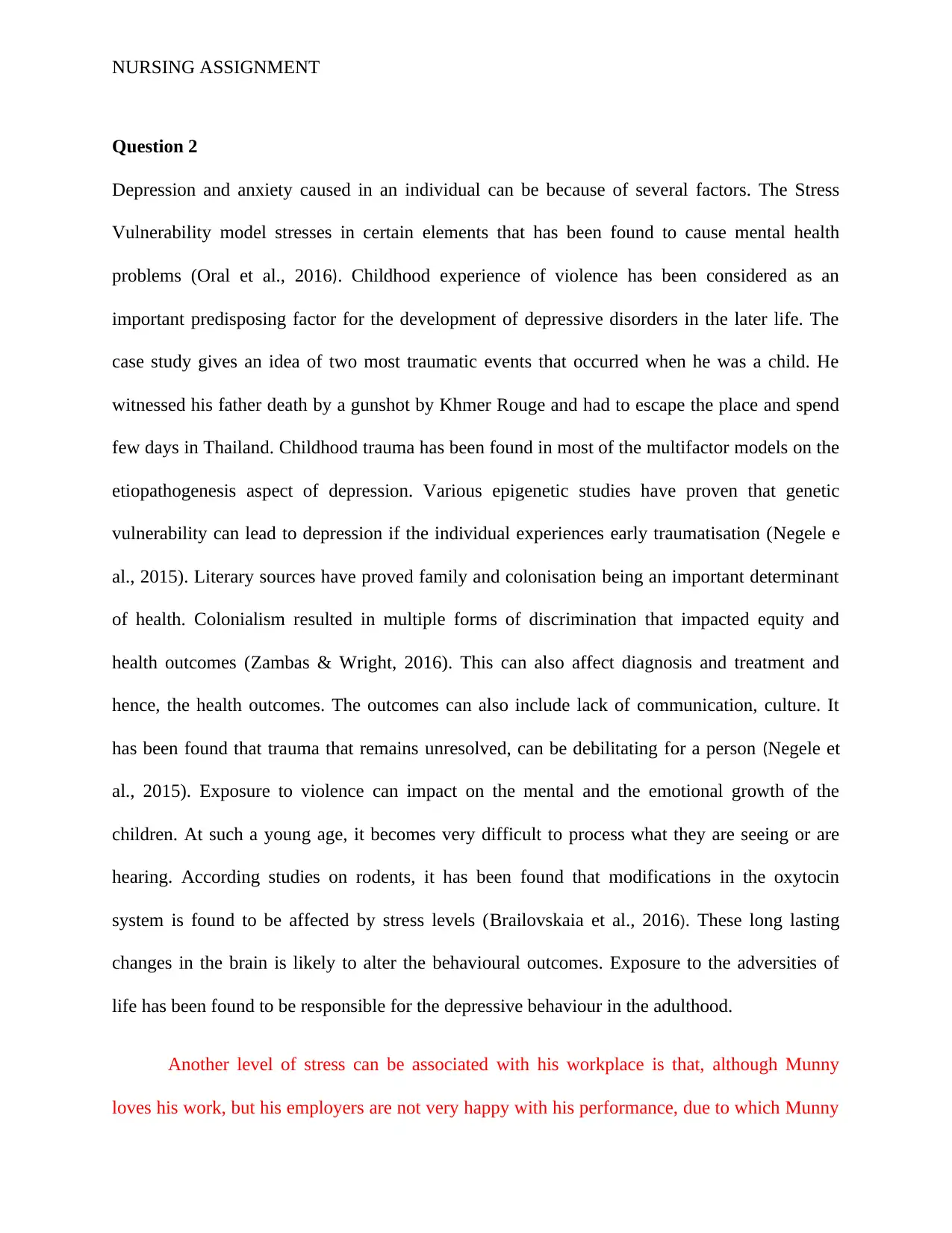
NURSING ASSIGNMENT
Question 2
Depression and anxiety caused in an individual can be because of several factors. The Stress
Vulnerability model stresses in certain elements that has been found to cause mental health
problems (Oral et al., 2016). Childhood experience of violence has been considered as an
important predisposing factor for the development of depressive disorders in the later life. The
case study gives an idea of two most traumatic events that occurred when he was a child. He
witnessed his father death by a gunshot by Khmer Rouge and had to escape the place and spend
few days in Thailand. Childhood trauma has been found in most of the multifactor models on the
etiopathogenesis aspect of depression. Various epigenetic studies have proven that genetic
vulnerability can lead to depression if the individual experiences early traumatisation (Negele e
al., 2015). Literary sources have proved family and colonisation being an important determinant
of health. Colonialism resulted in multiple forms of discrimination that impacted equity and
health outcomes (Zambas & Wright, 2016). This can also affect diagnosis and treatment and
hence, the health outcomes. The outcomes can also include lack of communication, culture. It
has been found that trauma that remains unresolved, can be debilitating for a person (Negele et
al., 2015). Exposure to violence can impact on the mental and the emotional growth of the
children. At such a young age, it becomes very difficult to process what they are seeing or are
hearing. According studies on rodents, it has been found that modifications in the oxytocin
system is found to be affected by stress levels (Brailovskaia et al., 2016). These long lasting
changes in the brain is likely to alter the behavioural outcomes. Exposure to the adversities of
life has been found to be responsible for the depressive behaviour in the adulthood.
Another level of stress can be associated with his workplace is that, although Munny
loves his work, but his employers are not very happy with his performance, due to which Munny
Question 2
Depression and anxiety caused in an individual can be because of several factors. The Stress
Vulnerability model stresses in certain elements that has been found to cause mental health
problems (Oral et al., 2016). Childhood experience of violence has been considered as an
important predisposing factor for the development of depressive disorders in the later life. The
case study gives an idea of two most traumatic events that occurred when he was a child. He
witnessed his father death by a gunshot by Khmer Rouge and had to escape the place and spend
few days in Thailand. Childhood trauma has been found in most of the multifactor models on the
etiopathogenesis aspect of depression. Various epigenetic studies have proven that genetic
vulnerability can lead to depression if the individual experiences early traumatisation (Negele e
al., 2015). Literary sources have proved family and colonisation being an important determinant
of health. Colonialism resulted in multiple forms of discrimination that impacted equity and
health outcomes (Zambas & Wright, 2016). This can also affect diagnosis and treatment and
hence, the health outcomes. The outcomes can also include lack of communication, culture. It
has been found that trauma that remains unresolved, can be debilitating for a person (Negele et
al., 2015). Exposure to violence can impact on the mental and the emotional growth of the
children. At such a young age, it becomes very difficult to process what they are seeing or are
hearing. According studies on rodents, it has been found that modifications in the oxytocin
system is found to be affected by stress levels (Brailovskaia et al., 2016). These long lasting
changes in the brain is likely to alter the behavioural outcomes. Exposure to the adversities of
life has been found to be responsible for the depressive behaviour in the adulthood.
Another level of stress can be associated with his workplace is that, although Munny
loves his work, but his employers are not very happy with his performance, due to which Munny
Paraphrase This Document
Need a fresh take? Get an instant paraphrase of this document with our AI Paraphraser
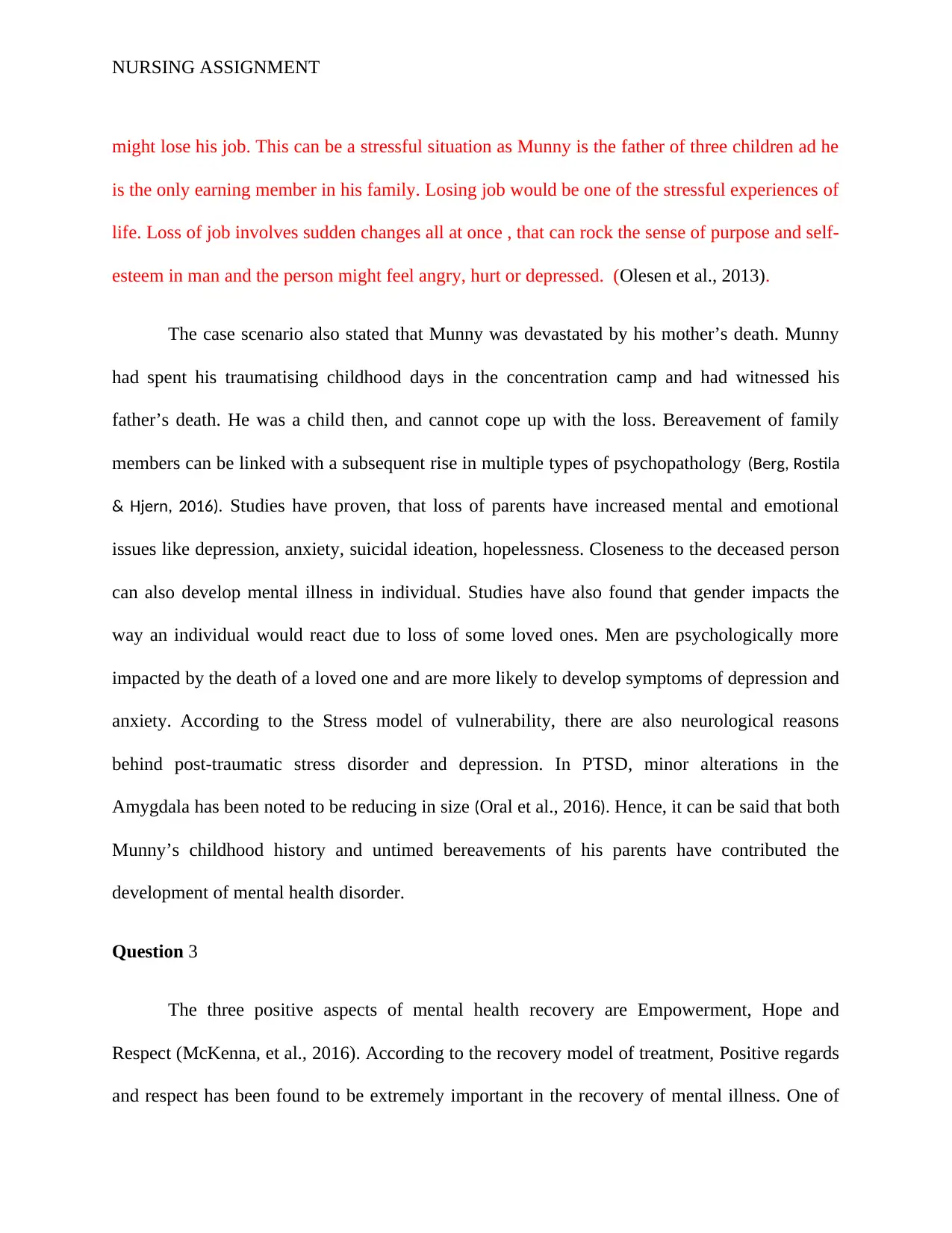
NURSING ASSIGNMENT
might lose his job. This can be a stressful situation as Munny is the father of three children ad he
is the only earning member in his family. Losing job would be one of the stressful experiences of
life. Loss of job involves sudden changes all at once , that can rock the sense of purpose and self-
esteem in man and the person might feel angry, hurt or depressed. (Olesen et al., 2013).
The case scenario also stated that Munny was devastated by his mother’s death. Munny
had spent his traumatising childhood days in the concentration camp and had witnessed his
father’s death. He was a child then, and cannot cope up with the loss. Bereavement of family
members can be linked with a subsequent rise in multiple types of psychopathology (Berg, Rostila
& Hjern, 2016). Studies have proven, that loss of parents have increased mental and emotional
issues like depression, anxiety, suicidal ideation, hopelessness. Closeness to the deceased person
can also develop mental illness in individual. Studies have also found that gender impacts the
way an individual would react due to loss of some loved ones. Men are psychologically more
impacted by the death of a loved one and are more likely to develop symptoms of depression and
anxiety. According to the Stress model of vulnerability, there are also neurological reasons
behind post-traumatic stress disorder and depression. In PTSD, minor alterations in the
Amygdala has been noted to be reducing in size (Oral et al., 2016). Hence, it can be said that both
Munny’s childhood history and untimed bereavements of his parents have contributed the
development of mental health disorder.
Question 3
The three positive aspects of mental health recovery are Empowerment, Hope and
Respect (McKenna, et al., 2016). According to the recovery model of treatment, Positive regards
and respect has been found to be extremely important in the recovery of mental illness. One of
might lose his job. This can be a stressful situation as Munny is the father of three children ad he
is the only earning member in his family. Losing job would be one of the stressful experiences of
life. Loss of job involves sudden changes all at once , that can rock the sense of purpose and self-
esteem in man and the person might feel angry, hurt or depressed. (Olesen et al., 2013).
The case scenario also stated that Munny was devastated by his mother’s death. Munny
had spent his traumatising childhood days in the concentration camp and had witnessed his
father’s death. He was a child then, and cannot cope up with the loss. Bereavement of family
members can be linked with a subsequent rise in multiple types of psychopathology (Berg, Rostila
& Hjern, 2016). Studies have proven, that loss of parents have increased mental and emotional
issues like depression, anxiety, suicidal ideation, hopelessness. Closeness to the deceased person
can also develop mental illness in individual. Studies have also found that gender impacts the
way an individual would react due to loss of some loved ones. Men are psychologically more
impacted by the death of a loved one and are more likely to develop symptoms of depression and
anxiety. According to the Stress model of vulnerability, there are also neurological reasons
behind post-traumatic stress disorder and depression. In PTSD, minor alterations in the
Amygdala has been noted to be reducing in size (Oral et al., 2016). Hence, it can be said that both
Munny’s childhood history and untimed bereavements of his parents have contributed the
development of mental health disorder.
Question 3
The three positive aspects of mental health recovery are Empowerment, Hope and
Respect (McKenna, et al., 2016). According to the recovery model of treatment, Positive regards
and respect has been found to be extremely important in the recovery of mental illness. One of
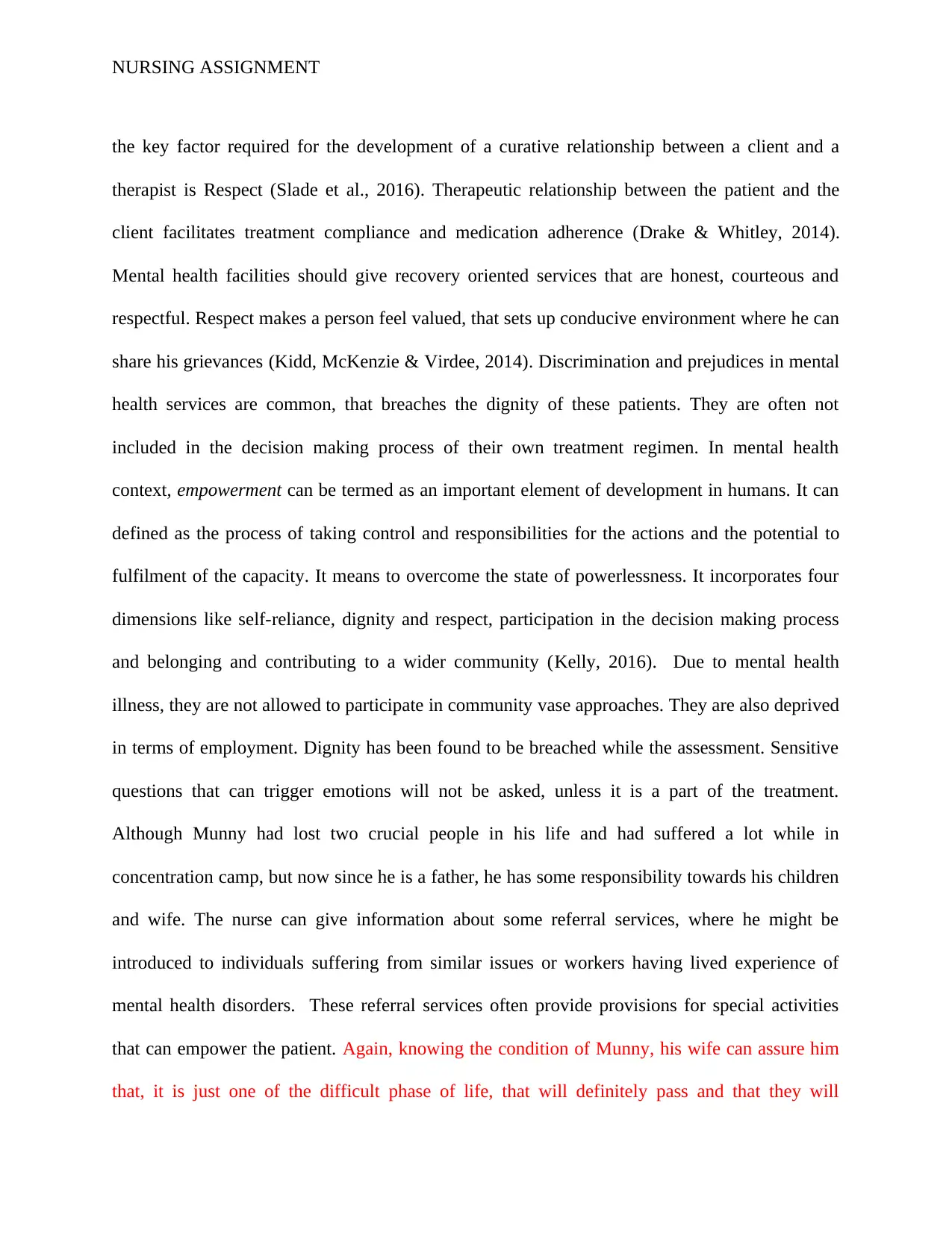
NURSING ASSIGNMENT
the key factor required for the development of a curative relationship between a client and a
therapist is Respect (Slade et al., 2016). Therapeutic relationship between the patient and the
client facilitates treatment compliance and medication adherence (Drake & Whitley, 2014).
Mental health facilities should give recovery oriented services that are honest, courteous and
respectful. Respect makes a person feel valued, that sets up conducive environment where he can
share his grievances (Kidd, McKenzie & Virdee, 2014). Discrimination and prejudices in mental
health services are common, that breaches the dignity of these patients. They are often not
included in the decision making process of their own treatment regimen. In mental health
context, empowerment can be termed as an important element of development in humans. It can
defined as the process of taking control and responsibilities for the actions and the potential to
fulfilment of the capacity. It means to overcome the state of powerlessness. It incorporates four
dimensions like self-reliance, dignity and respect, participation in the decision making process
and belonging and contributing to a wider community (Kelly, 2016). Due to mental health
illness, they are not allowed to participate in community vase approaches. They are also deprived
in terms of employment. Dignity has been found to be breached while the assessment. Sensitive
questions that can trigger emotions will not be asked, unless it is a part of the treatment.
Although Munny had lost two crucial people in his life and had suffered a lot while in
concentration camp, but now since he is a father, he has some responsibility towards his children
and wife. The nurse can give information about some referral services, where he might be
introduced to individuals suffering from similar issues or workers having lived experience of
mental health disorders. These referral services often provide provisions for special activities
that can empower the patient. Again, knowing the condition of Munny, his wife can assure him
that, it is just one of the difficult phase of life, that will definitely pass and that they will
the key factor required for the development of a curative relationship between a client and a
therapist is Respect (Slade et al., 2016). Therapeutic relationship between the patient and the
client facilitates treatment compliance and medication adherence (Drake & Whitley, 2014).
Mental health facilities should give recovery oriented services that are honest, courteous and
respectful. Respect makes a person feel valued, that sets up conducive environment where he can
share his grievances (Kidd, McKenzie & Virdee, 2014). Discrimination and prejudices in mental
health services are common, that breaches the dignity of these patients. They are often not
included in the decision making process of their own treatment regimen. In mental health
context, empowerment can be termed as an important element of development in humans. It can
defined as the process of taking control and responsibilities for the actions and the potential to
fulfilment of the capacity. It means to overcome the state of powerlessness. It incorporates four
dimensions like self-reliance, dignity and respect, participation in the decision making process
and belonging and contributing to a wider community (Kelly, 2016). Due to mental health
illness, they are not allowed to participate in community vase approaches. They are also deprived
in terms of employment. Dignity has been found to be breached while the assessment. Sensitive
questions that can trigger emotions will not be asked, unless it is a part of the treatment.
Although Munny had lost two crucial people in his life and had suffered a lot while in
concentration camp, but now since he is a father, he has some responsibility towards his children
and wife. The nurse can give information about some referral services, where he might be
introduced to individuals suffering from similar issues or workers having lived experience of
mental health disorders. These referral services often provide provisions for special activities
that can empower the patient. Again, knowing the condition of Munny, his wife can assure him
that, it is just one of the difficult phase of life, that will definitely pass and that they will
⊘ This is a preview!⊘
Do you want full access?
Subscribe today to unlock all pages.

Trusted by 1+ million students worldwide
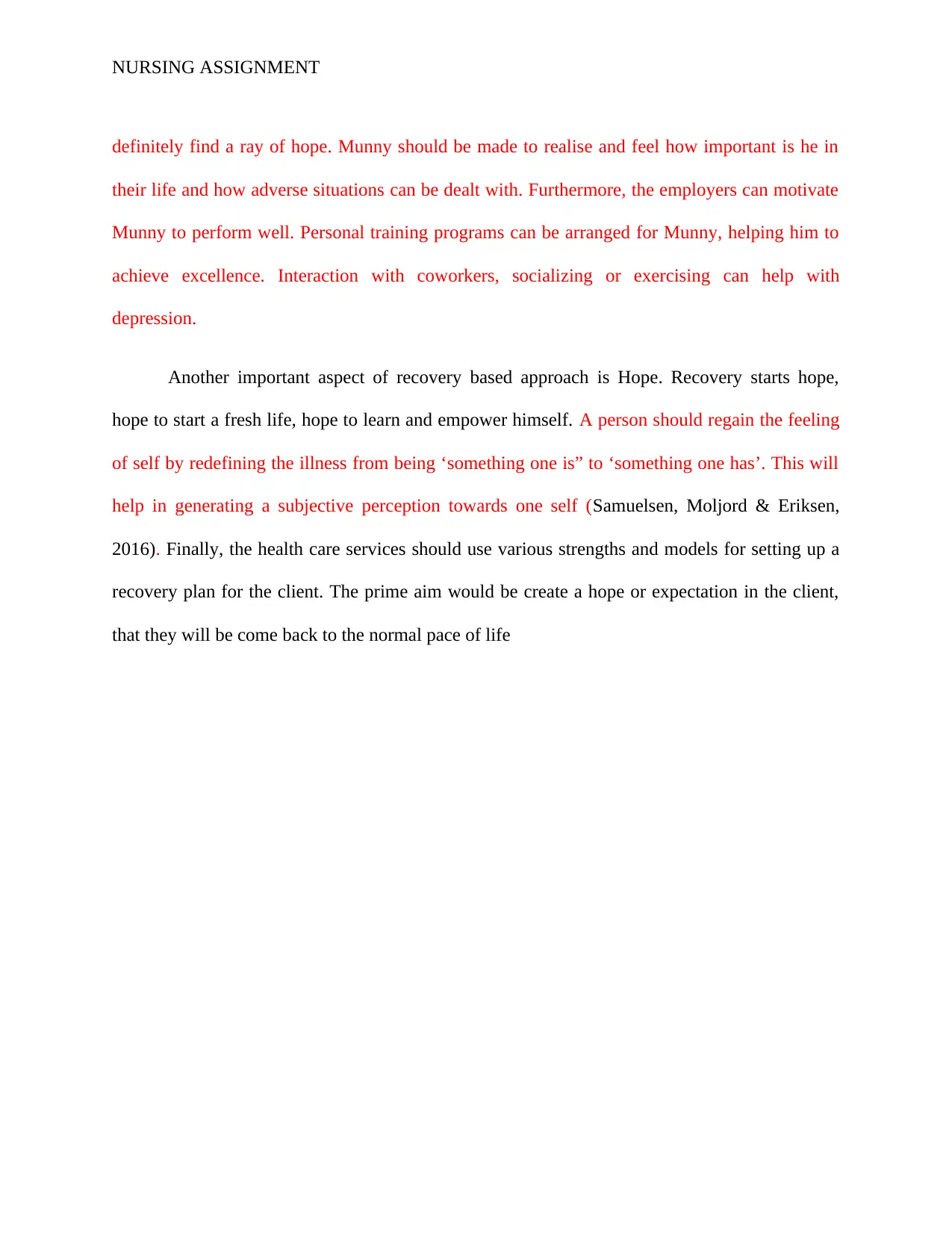
NURSING ASSIGNMENT
definitely find a ray of hope. Munny should be made to realise and feel how important is he in
their life and how adverse situations can be dealt with. Furthermore, the employers can motivate
Munny to perform well. Personal training programs can be arranged for Munny, helping him to
achieve excellence. Interaction with coworkers, socializing or exercising can help with
depression.
Another important aspect of recovery based approach is Hope. Recovery starts hope,
hope to start a fresh life, hope to learn and empower himself. A person should regain the feeling
of self by redefining the illness from being ‘something one is” to ‘something one has’. This will
help in generating a subjective perception towards one self (Samuelsen, Moljord & Eriksen,
2016). Finally, the health care services should use various strengths and models for setting up a
recovery plan for the client. The prime aim would be create a hope or expectation in the client,
that they will be come back to the normal pace of life
definitely find a ray of hope. Munny should be made to realise and feel how important is he in
their life and how adverse situations can be dealt with. Furthermore, the employers can motivate
Munny to perform well. Personal training programs can be arranged for Munny, helping him to
achieve excellence. Interaction with coworkers, socializing or exercising can help with
depression.
Another important aspect of recovery based approach is Hope. Recovery starts hope,
hope to start a fresh life, hope to learn and empower himself. A person should regain the feeling
of self by redefining the illness from being ‘something one is” to ‘something one has’. This will
help in generating a subjective perception towards one self (Samuelsen, Moljord & Eriksen,
2016). Finally, the health care services should use various strengths and models for setting up a
recovery plan for the client. The prime aim would be create a hope or expectation in the client,
that they will be come back to the normal pace of life
Paraphrase This Document
Need a fresh take? Get an instant paraphrase of this document with our AI Paraphraser
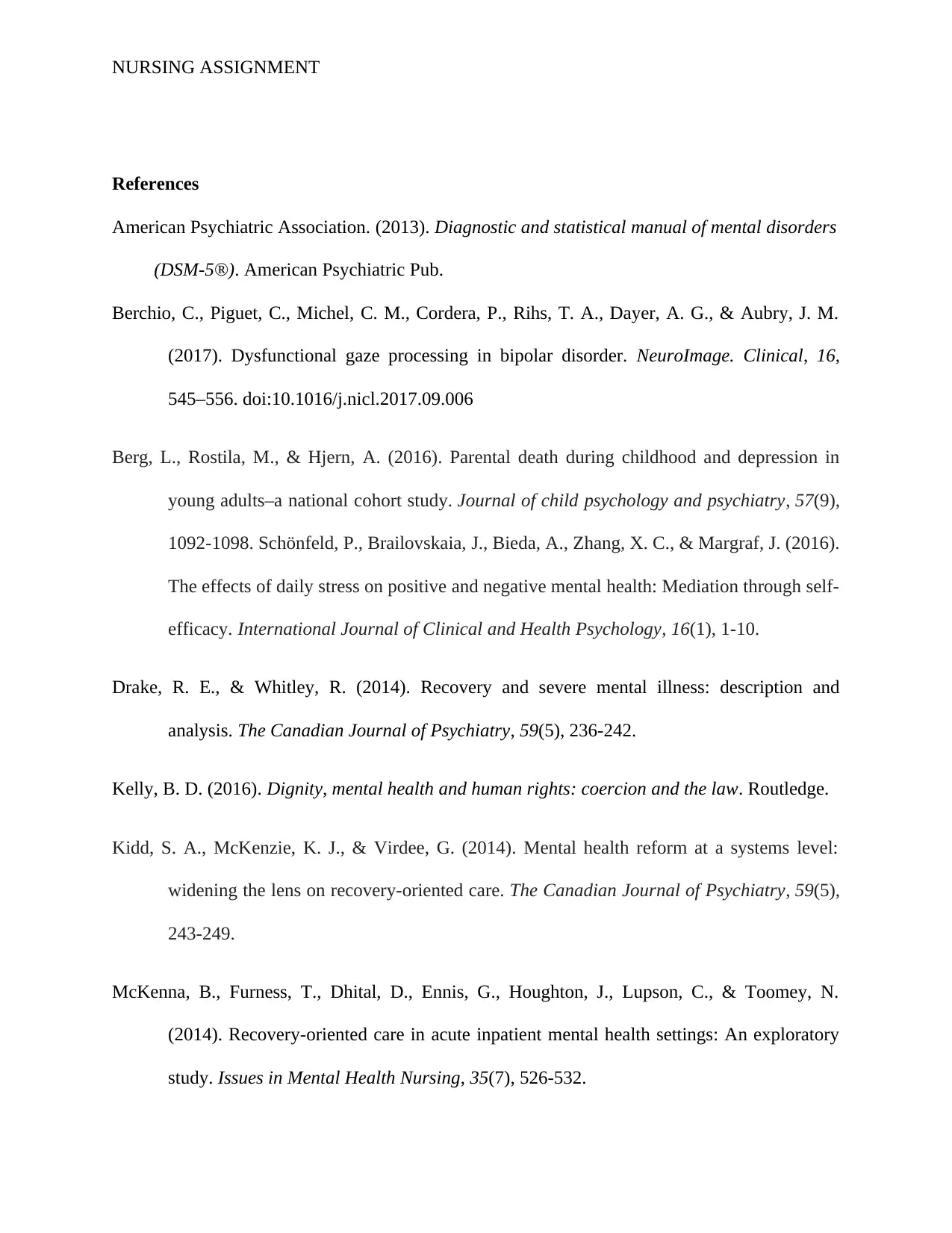
NURSING ASSIGNMENT
References
American Psychiatric Association. (2013). Diagnostic and statistical manual of mental disorders
(DSM-5®). American Psychiatric Pub.
Berchio, C., Piguet, C., Michel, C. M., Cordera, P., Rihs, T. A., Dayer, A. G., & Aubry, J. M.
(2017). Dysfunctional gaze processing in bipolar disorder. NeuroImage. Clinical, 16,
545–556. doi:10.1016/j.nicl.2017.09.006
Berg, L., Rostila, M., & Hjern, A. (2016). Parental death during childhood and depression in
young adults–a national cohort study. Journal of child psychology and psychiatry, 57(9),
1092-1098. Schönfeld, P., Brailovskaia, J., Bieda, A., Zhang, X. C., & Margraf, J. (2016).
The effects of daily stress on positive and negative mental health: Mediation through self-
efficacy. International Journal of Clinical and Health Psychology, 16(1), 1-10.
Drake, R. E., & Whitley, R. (2014). Recovery and severe mental illness: description and
analysis. The Canadian Journal of Psychiatry, 59(5), 236-242.
Kelly, B. D. (2016). Dignity, mental health and human rights: coercion and the law. Routledge.
Kidd, S. A., McKenzie, K. J., & Virdee, G. (2014). Mental health reform at a systems level:
widening the lens on recovery-oriented care. The Canadian Journal of Psychiatry, 59(5),
243-249.
McKenna, B., Furness, T., Dhital, D., Ennis, G., Houghton, J., Lupson, C., & Toomey, N.
(2014). Recovery-oriented care in acute inpatient mental health settings: An exploratory
study. Issues in Mental Health Nursing, 35(7), 526-532.
References
American Psychiatric Association. (2013). Diagnostic and statistical manual of mental disorders
(DSM-5®). American Psychiatric Pub.
Berchio, C., Piguet, C., Michel, C. M., Cordera, P., Rihs, T. A., Dayer, A. G., & Aubry, J. M.
(2017). Dysfunctional gaze processing in bipolar disorder. NeuroImage. Clinical, 16,
545–556. doi:10.1016/j.nicl.2017.09.006
Berg, L., Rostila, M., & Hjern, A. (2016). Parental death during childhood and depression in
young adults–a national cohort study. Journal of child psychology and psychiatry, 57(9),
1092-1098. Schönfeld, P., Brailovskaia, J., Bieda, A., Zhang, X. C., & Margraf, J. (2016).
The effects of daily stress on positive and negative mental health: Mediation through self-
efficacy. International Journal of Clinical and Health Psychology, 16(1), 1-10.
Drake, R. E., & Whitley, R. (2014). Recovery and severe mental illness: description and
analysis. The Canadian Journal of Psychiatry, 59(5), 236-242.
Kelly, B. D. (2016). Dignity, mental health and human rights: coercion and the law. Routledge.
Kidd, S. A., McKenzie, K. J., & Virdee, G. (2014). Mental health reform at a systems level:
widening the lens on recovery-oriented care. The Canadian Journal of Psychiatry, 59(5),
243-249.
McKenna, B., Furness, T., Dhital, D., Ennis, G., Houghton, J., Lupson, C., & Toomey, N.
(2014). Recovery-oriented care in acute inpatient mental health settings: An exploratory
study. Issues in Mental Health Nursing, 35(7), 526-532.
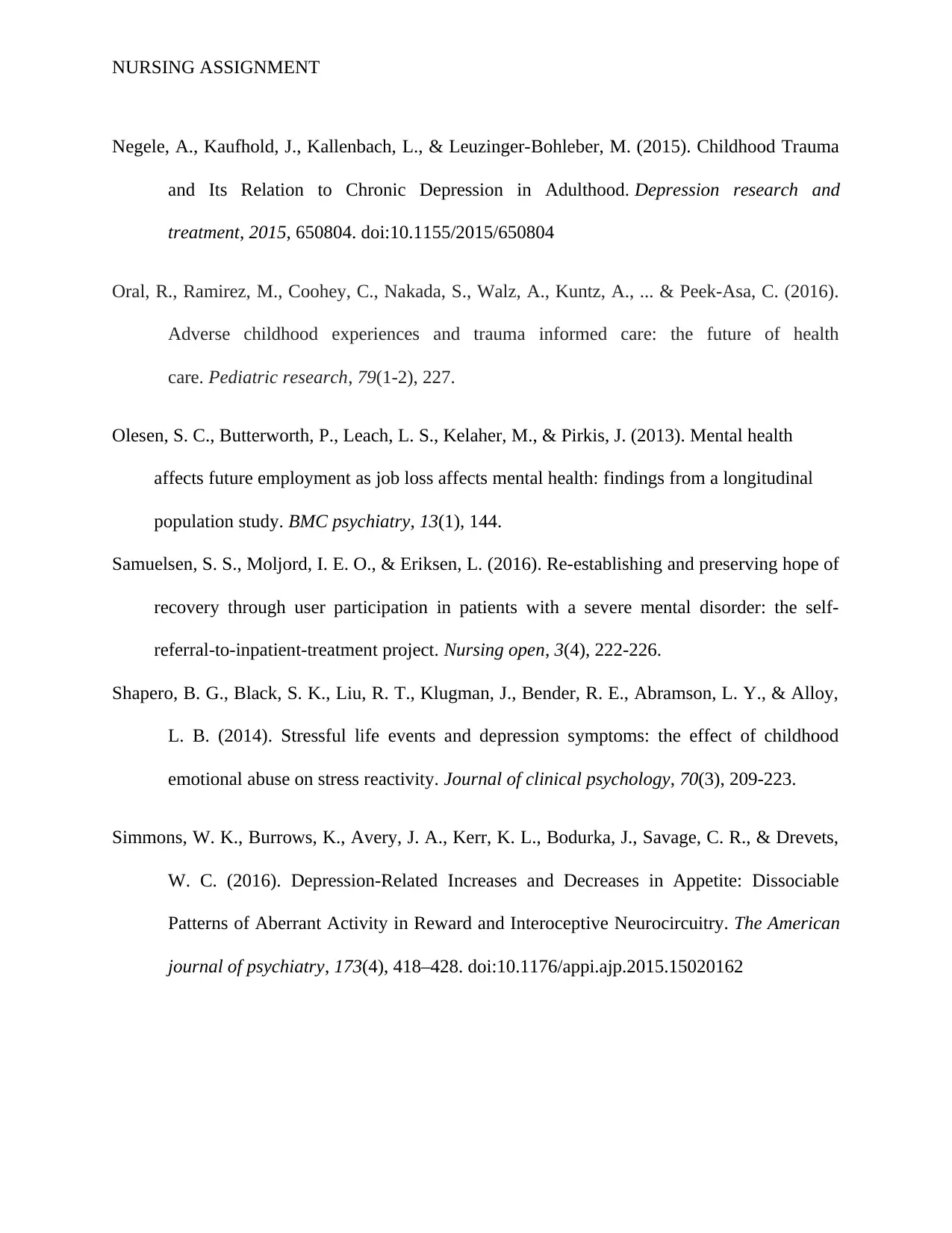
NURSING ASSIGNMENT
Negele, A., Kaufhold, J., Kallenbach, L., & Leuzinger-Bohleber, M. (2015). Childhood Trauma
and Its Relation to Chronic Depression in Adulthood. Depression research and
treatment, 2015, 650804. doi:10.1155/2015/650804
Oral, R., Ramirez, M., Coohey, C., Nakada, S., Walz, A., Kuntz, A., ... & Peek-Asa, C. (2016).
Adverse childhood experiences and trauma informed care: the future of health
care. Pediatric research, 79(1-2), 227.
Olesen, S. C., Butterworth, P., Leach, L. S., Kelaher, M., & Pirkis, J. (2013). Mental health
affects future employment as job loss affects mental health: findings from a longitudinal
population study. BMC psychiatry, 13(1), 144.
Samuelsen, S. S., Moljord, I. E. O., & Eriksen, L. (2016). Re‐establishing and preserving hope of
recovery through user participation in patients with a severe mental disorder: the self‐
referral‐to‐inpatient‐treatment project. Nursing open, 3(4), 222-226.
Shapero, B. G., Black, S. K., Liu, R. T., Klugman, J., Bender, R. E., Abramson, L. Y., & Alloy,
L. B. (2014). Stressful life events and depression symptoms: the effect of childhood
emotional abuse on stress reactivity. Journal of clinical psychology, 70(3), 209-223.
Simmons, W. K., Burrows, K., Avery, J. A., Kerr, K. L., Bodurka, J., Savage, C. R., & Drevets,
W. C. (2016). Depression-Related Increases and Decreases in Appetite: Dissociable
Patterns of Aberrant Activity in Reward and Interoceptive Neurocircuitry. The American
journal of psychiatry, 173(4), 418–428. doi:10.1176/appi.ajp.2015.15020162
Negele, A., Kaufhold, J., Kallenbach, L., & Leuzinger-Bohleber, M. (2015). Childhood Trauma
and Its Relation to Chronic Depression in Adulthood. Depression research and
treatment, 2015, 650804. doi:10.1155/2015/650804
Oral, R., Ramirez, M., Coohey, C., Nakada, S., Walz, A., Kuntz, A., ... & Peek-Asa, C. (2016).
Adverse childhood experiences and trauma informed care: the future of health
care. Pediatric research, 79(1-2), 227.
Olesen, S. C., Butterworth, P., Leach, L. S., Kelaher, M., & Pirkis, J. (2013). Mental health
affects future employment as job loss affects mental health: findings from a longitudinal
population study. BMC psychiatry, 13(1), 144.
Samuelsen, S. S., Moljord, I. E. O., & Eriksen, L. (2016). Re‐establishing and preserving hope of
recovery through user participation in patients with a severe mental disorder: the self‐
referral‐to‐inpatient‐treatment project. Nursing open, 3(4), 222-226.
Shapero, B. G., Black, S. K., Liu, R. T., Klugman, J., Bender, R. E., Abramson, L. Y., & Alloy,
L. B. (2014). Stressful life events and depression symptoms: the effect of childhood
emotional abuse on stress reactivity. Journal of clinical psychology, 70(3), 209-223.
Simmons, W. K., Burrows, K., Avery, J. A., Kerr, K. L., Bodurka, J., Savage, C. R., & Drevets,
W. C. (2016). Depression-Related Increases and Decreases in Appetite: Dissociable
Patterns of Aberrant Activity in Reward and Interoceptive Neurocircuitry. The American
journal of psychiatry, 173(4), 418–428. doi:10.1176/appi.ajp.2015.15020162
⊘ This is a preview!⊘
Do you want full access?
Subscribe today to unlock all pages.

Trusted by 1+ million students worldwide
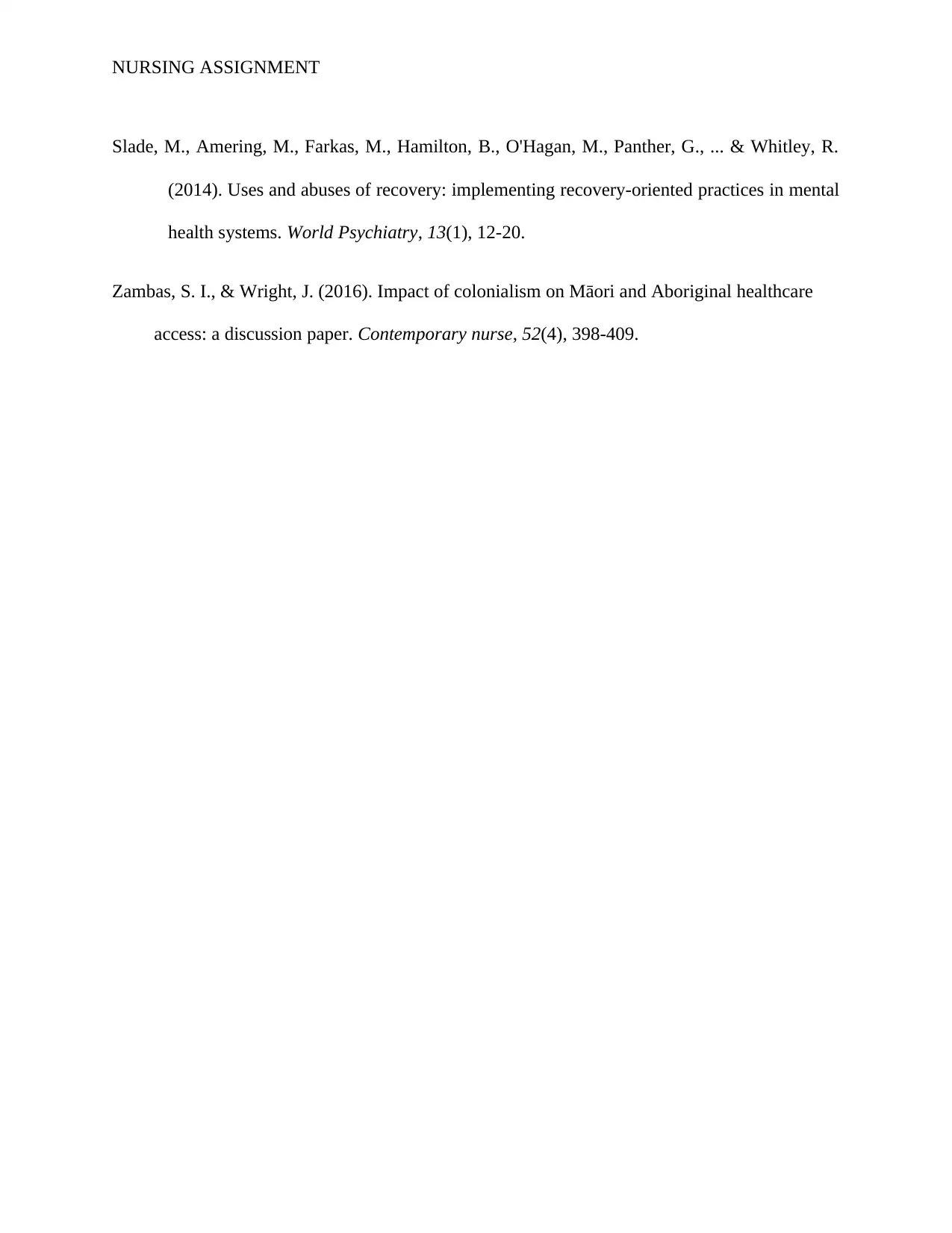
NURSING ASSIGNMENT
Slade, M., Amering, M., Farkas, M., Hamilton, B., O'Hagan, M., Panther, G., ... & Whitley, R.
(2014). Uses and abuses of recovery: implementing recovery‐oriented practices in mental
health systems. World Psychiatry, 13(1), 12-20.
Zambas, S. I., & Wright, J. (2016). Impact of colonialism on Māori and Aboriginal healthcare
access: a discussion paper. Contemporary nurse, 52(4), 398-409.
Slade, M., Amering, M., Farkas, M., Hamilton, B., O'Hagan, M., Panther, G., ... & Whitley, R.
(2014). Uses and abuses of recovery: implementing recovery‐oriented practices in mental
health systems. World Psychiatry, 13(1), 12-20.
Zambas, S. I., & Wright, J. (2016). Impact of colonialism on Māori and Aboriginal healthcare
access: a discussion paper. Contemporary nurse, 52(4), 398-409.
1 out of 10
Related Documents
Your All-in-One AI-Powered Toolkit for Academic Success.
+13062052269
info@desklib.com
Available 24*7 on WhatsApp / Email
![[object Object]](/_next/static/media/star-bottom.7253800d.svg)
Unlock your academic potential
Copyright © 2020–2025 A2Z Services. All Rights Reserved. Developed and managed by ZUCOL.





